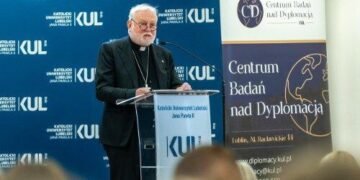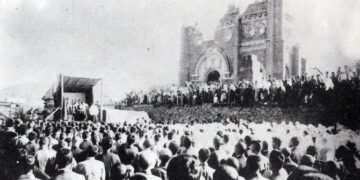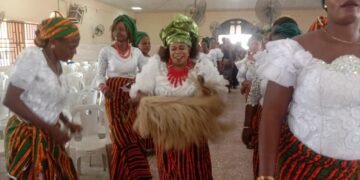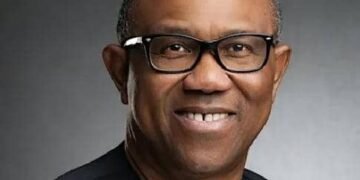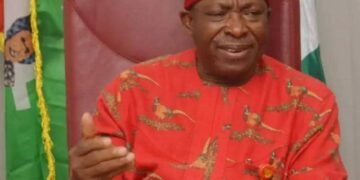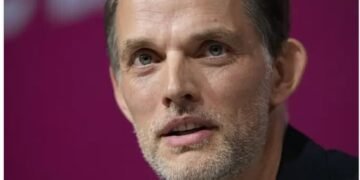By Charles Igwe
Archbishop Paul Richard Gallagher, the Vatican’s Secretary for Relations with States and International Organizations, has described the Holy See’s diplomacy as a “field hospital amid a battle,” emphasizing its unwavering commitment to fostering peace, protecting human dignity, and addressing global challenges. Delivering a presentation titled “The Diplomacy of the Holy See in the Contemporary World” at the Catholic University of Lublin (KUL), Gallagher outlined the Vatican’s diplomatic mission and its vital role in international relations, often leveraging “soft power” to achieve outcomes that major global powers may struggle to accomplish.
Archbishop Gallagher highlighted the Holy See’s historical commitment to dialogue and bridge-building, noting its role in conflict resolution across regions such as Ukraine, the Middle East, Africa, and the Caucasus. This “diplomacy of mercy” emphasizes solidarity and the common good, not as abstract ideals but through tangible actions like promoting debt relief, human dignity, and cooperative development policies. The Vatican’s behind-the-scenes efforts often facilitate family reunifications, prisoner exchanges, and humanitarian aid in war-torn regions, guided by the principle that civilian lives must never be compromised for military objectives.
Central to Vatican diplomacy is the Pope himself, whose moral authority and global influence drive the Holy See’s initiatives. Archbishop Gallagher underscored the impact of Pope Francis’ exhortations, prayers, encyclicals, and apostolic journeys, which confront global injustices, support marginalized populations, and promote sustainable development. This tradition of papal diplomacy was also evident during the pontificate of John Paul II, particularly in addressing issues in Eastern Europe.
Archbishop Gallagher reaffirmed the Holy See’s commitment to fundamental human rights, including the sanctity of life from conception to natural death. He criticized attempts by some nations or coalitions to impose ideological conditions on humanitarian aid, emphasizing the Vatican’s consistent defense of moral principles. On religious freedom, the Archbishop reiterated the need to resist its instrumentalization for political disputes, advocating for a healthy dialogue between states and religious communities as partners, not adversaries.
The Holy See’s diplomacy extends to tackling modern challenges, including migration, environmental stewardship, and economic justice. With nearly 120 million people displaced globally, the Vatican calls for humane migration policies that address root causes like poverty and conflict. Gallagher also spoke against the “throwaway culture” that devalues human dignity and highlighted concerns about artificial intelligence and the ethical implications of technological progress.
In combating human trafficking, Pope Francis remains a leading moral voice, urging governments to address underlying causes such as poverty, corruption, and economic exclusion. This commitment to justice and dignity reflects the Holy See’s broader mission to serve as a sign of hope in a fragmented world.
Archbishop Gallagher detailed the Holy See’s bilateral diplomacy through concordats and agreements with various nations, ensuring effective cooperation in social and religious spheres while safeguarding the Church’s autonomy. He cited the Provisional Agreement with China on bishop appointments as an example of these efforts. Additionally, the Vatican’s participation in international organizations since 1949 underscores its role as an ethical leader, fostering dialogue and cooperation beyond political alliances.
In conclusion, the Archbishop emphasized that the Holy See’s diplomatic mission remains steadfast in promoting stability, security, and peace. By acting as a “trustworthy mediator,” the Vatican continues to build bridges in a polarized world, offering ethical leadership and affirming humanity’s shared longing for justice and fraternity.
